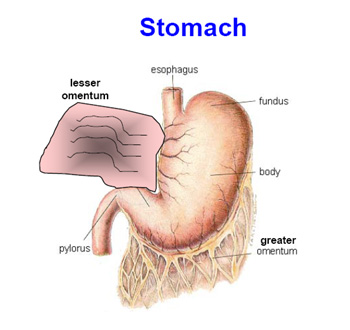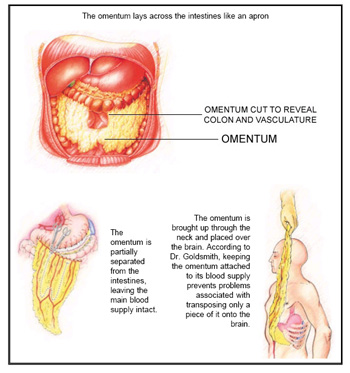Yesterday I received a question in the comment section for my post What is an Omentum and What does it Look Like?. The comment was from Gerilynn who asked “If you have a tummy tuck or lipo will it hurt the omentum?”
I began to respond to her comment, and then decided to turn this into a post, since my response became rather lengthy. I think she asked a good question and she inspired this post (thank you Gerilynn! 🙂 ) that will help to further explain just what (and where) your omentum really is. Since this is an organ that has only recently begun to get talked about (perhaps I’m wrong about this, but it’s new to me), I am happy to provide more details.
**Please note: I do not advocate surgery for weight loss. I can understand why people who were previously morbidly obese get tummy tucks, however I am on the side of “old fashioned” healthy living for weight loss. This post is only to further explain the omentum and relate it the question that was asked, not to promote liposuction or tummy tucks (abdominoplasty).
 Your omentum is inside your abdomen, basically hanging off of your stomach. In the image to the left, you can see the greater omentum, the organ that I have been writing about here at Fearless Fat Loss. You can see how and where it is attached to the stomach. If you would like to view a larger version of this image, just open this PDF document from San Mateo Community College and go to page 43.
Your omentum is inside your abdomen, basically hanging off of your stomach. In the image to the left, you can see the greater omentum, the organ that I have been writing about here at Fearless Fat Loss. You can see how and where it is attached to the stomach. If you would like to view a larger version of this image, just open this PDF document from San Mateo Community College and go to page 43.
The omentum extends downward from the stomach and lies over the intestines. It is full of blood vessels and if it is clogged with fat, it becomes rather clumpy. When it is overweight and fatty, it can produce what looks like a beer belly, however the fat belly is being produced from inside the body, rather than from fat in the subcutaneous layer of your skin.
I have found a page on a site for you to refer to that explains the 3 levels of fat very well. This site (I neither endorse nor deny this site, as I do not have any personal experience with their company) is actually related to liposuction, and again, as I stated above, I do not advocate surgery for weight loss. I do like that on the page I am referring you to, the author has stated the same:
Please let me stress that Liposuction is not a quick or easy means to lose weight. An “ideal” candidate should have a healthy diet, participate in a good amount of activity and have a steady and healthy body weight.
Now, as far as the 3 different levels of fat, there are “two layers of subcutaneous fat (the deep layer & superficial layer) and the third is known as visceral fat, or omentum”. When you have liposuction, if you are seeing a board-certified, skilled, upstanding, surgeon, they should only be doing liposuction within your subcutaneous layer(s) of skin to “suck out” that fat.
I have watched shows on Discovery Health where people have not used a board-certified surgeon (or used an inexperienced one) and had their intestines punctured when they had lipo on their abdomens. This is highly dangerous and can be fatal, which is why you need to make sure that if you are going to have liposuction done, that you research the surgeon thoroughly.
Since the abdominal cavity is not invaded when performing liposuction on the stomach or abdominal area, the omentum would not be touched. I cannot imagine there being the option of surgery to reduce the size of one’s omentum for the purpose of weight loss and a smaller stomach, however stranger things have happened. 😉
I do know that the more I learn about the omentum in my research, the more amazing I am finding this organ to be. For instance, if you read one of my previous articles on the omentum, I included a link to a document that outlines all of the ways that the omentum is being used in surgery for healing purposes in India.  I also came across some amazing information yesterday regarding how the omentum can be used to treat Alzheimer’s!
I also came across some amazing information yesterday regarding how the omentum can be used to treat Alzheimer’s!
You can see in the image on the left, that the omentum is partially separated and brought up through the neck to lie on the brain of the patient who is suffering from Alzheimer’s. According to the article from Le Magazine that reports this information, the omentum is amazingly “brain-like”, and has “a striking ability to generate neurochemicals that nourish nerves and help them grow.” When the omentum is laid over the brain, one of these neurochemicals, fibroblast growth factor (FGF), “has been shown to provoke the growth of new brain cells in areas of the brain” that are affected by Alzheimer’s Disease.
The reason that I bring up the above two pieces of information is to impress upon you why I think that the omentum should not be messed with IF it does ever come to pass that you have the option to reduce it (and therefore, your belly size) with surgery. The best, and healthiest way to reduce your overweight omentum is through healthy eating and regular exercise.
As far as whether or not a tummy tuck would harm your omentum, a tummy tuck procedure is also not supposed to invade the abdominal cavity, which is where your omentum “lives”. The skin on the stomach is peeled back, the abdominal muscles are stitched together to tighten them, and the skin is then stretched to cover the abdomen, while the excess is cut off. The surgeon wouldn’t be going beyond the abdominal muscle wall and entering the abdominal cavity.
To get your omentum healthy again and get rid of the apple shape of your body, the best way is to eat whole, healthy foods, eat only when hungry, stop when you are full, drink plenty of water, and exercise regularly. If you do opt for liposuction or a tummy tuck, as long as you use a board-certified surgeon who you have fully researched, there shouldn’t be any harm done to your omentum through those procedures.
For more details on your omentum and how it relates to the issue of overweight and your health, please read my previous posts:





With all these risks involved in liposuction, I’d rather have a good and effective exercise routine. Being overweight simply means that you’re not moving enough to burn all the fats you’ve accumulated from eating. I’d rather move a lot than to suffer the consequences of lipo.
Wow. That’s fascinating!
What is really interesting to me is the chemicals released. There’s been a lot of research done that shows that some of our “brain” is in our “gut”. (Some of it is also related to glands on the kidneys) This is just more to add to that.
Well written post. I’m glad to have come across this.
Hi Laurie,
Thanks for your comments and your kind words!
You’re right about our gut being a second brain, I was learning about that in the book “You On A Diet”. Our intestines are very sensitive and function like a second brain, it is truly amazing. I haven’t heard about the glands on the kidneys, thank you for that info.! 🙂